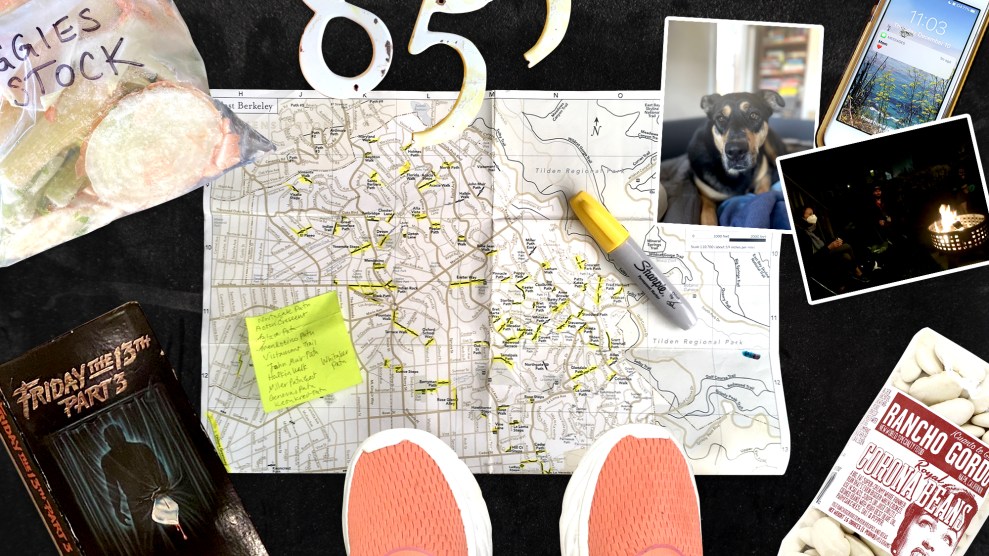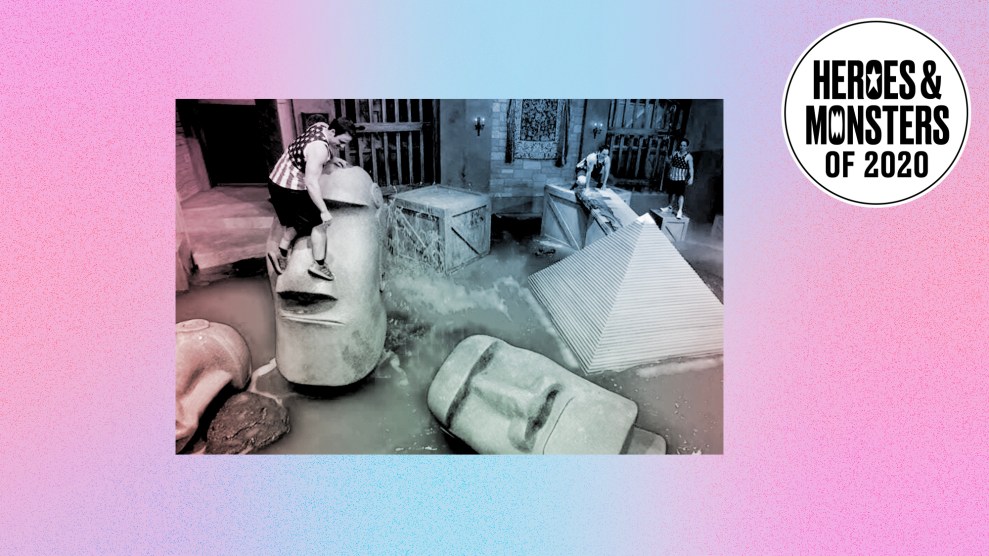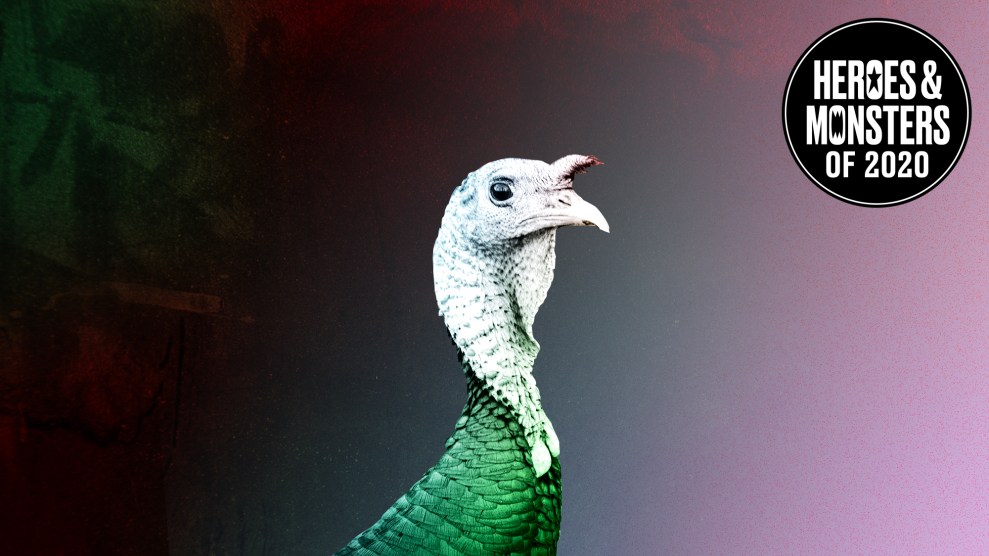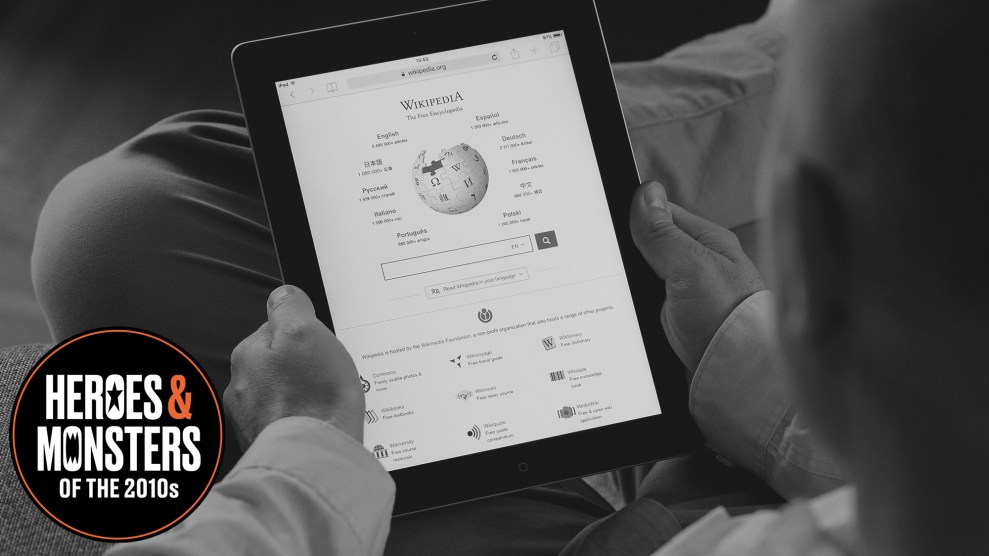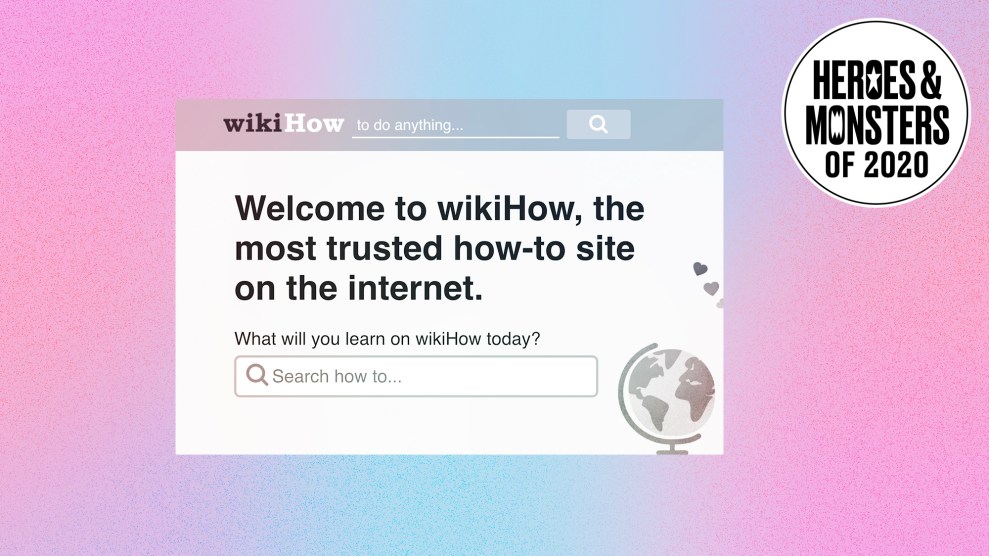
Mother Jones illustration; wikiHow
One afternoon, I looked at the room that has served as my office, gym, restaurant, doggy daycare, Zoom background, and home for most of this year and flew into a rage.
My complaints were many. The room was cramped. The room was cluttered. The room was always 15 degrees hotter than the rest of the apartment. The couch—starting to develop a permanent crater from housing my ass in the exact same spot for between 8 and 12 hours a day—hurt my back.
I convinced myself that, despite all the problems, there was a solution. I needed a desk. If I just had a desk—a proper workspace—everything would be a little less terrible. Already unglued from reality, I decided on the worst way to pursue this harmony: I decided to build it myself.
But how? In ancient times, perhaps cave dwellers learned to build fires by watching their cave-neighbors. In the recent past, you could have asked a friend to come over and guide you through home improvement tasks. In a pandemic, there was a single choice. I went to the only good website on the entire godforsaken World Wide Web: wikiHow.
For the uninitiated, wikiHow is a Wikipedia-esque crowdsourced encyclopedia of step-by-step instructions on how to do almost anything. You can learn everything from how to clean dirty ski gloves to how to defend human rights. Among some of the site’s founding principles: knowledge should be widely accessible, users should own the content they produce, and when it comes to content, more is more—there’s no issue too big or too small to justify a wikiHow explainer. As Kaitlyn Tiffany wrote for the Atlantic last year, wikiHow uses “radical collaboration to assemble a model for how to live a life.” She continued:
wikiHow is a website no one thinks about until they need something […] It’s one of very few common resources that have been remixed mostly for fun and almost never for evil, and it may be the largest commercial platform in existence that hasn’t been accused of exploiting its users.
So much of everyday life has moved online since the start of the coronavirus pandemic. And yet the internet seems as dangerous as ever. Every day I log on feels like an exercise in dodging landmines of disinformation and desperately guarding whatever semblance of personal data I have left. But wikiHow is my online safe-harbor. Back in April, it taught me how to make a no-sew face mask out of a bandana when every mask sold online was backordered for weeks. And I’m not alone. According to Elizabeth Douglas, wikiHow’s CEO, the site’s traffic jumped 25 percent early in the pandemic, with hundreds of millions of people like me trying to make sense of their new, locked-down world. Health and wellness articles started trending; the article How to Make Hand Sanitizer has more than 2.1 million views so far; How to Use Hair Clippers, and How to Find Replacements for Toilet Paper were also popular.
Then spring gave way to summer, and staying at home started to wear on us all. We looked for new COVID-approved hobbies. Millions of people have asked How to Fix Dough That Won’t Rise, How to Play Monopoly, and How to Send a Google Hangouts Invite. I learned how to tie dye a sweatsuit (my new work-from-home uniform) and how to save an overwatered plant (through no fault of wikiHow, this one was unsuccessful; RIP rubber tree).
Recently, the site partnered with the United Nations to combat misinformation online, with articles such as How to Find Trusted Advice on COVID-19, and Mental Health America to provide advice and resources for people struggling with stress, depression, and anxiety during the pandemic.
“It’s wikiHow’s mission to help everyone on the planet learn how to do anything, and we’ve always done that with a warmth, gentle humor, and inclusivity not often found on encyclopedic or educational sites,” Douglas told me. She said through months of shutdowns and sheltering in place, the site has tried to answer obvious questions that people would normally ask their family or friends, as well as the not-so-obvious. “[W]e could have never predicted that every household in North America and beyond would need to read an article like ‘How to Freeze Milk‘, but we are there.” (That article in particular has a perfect five-star rating from 100 percent of reviewers.)
wikiHow is the ultimate pandemic hero because it’s utilitarian, earnest (see: How to Support an Autistic Family Member at Christmas), and even willing to laugh at itself (see: How to Appreciate wikiHow). Tens of thousands of Reddit users contribute to r/weirdwikihow and r/wikihowmemes, where they share original and meme-ified versions of wikiHow’s iconic illustrations.
On TikTok, youths reenact the most outlandish wikiHow suggestions as part of the viral #wikichallenge.
@ricekrrt #firstpost #fyp #foryoupage#wikihow #wikichallenge @shammymanny
These days, as my city heads back into lockdown, I’m feeling slightly better prepared for a winter spent inside, alone. I did end up building and staining a hybrid desk-console-table thing—using a drill and sandpaper and polyurethane and, of course, wikiHow. It’s not the cure-all I’d hoped for, but it turned out better than I expected, which is more than I can say about the rest of this year.

